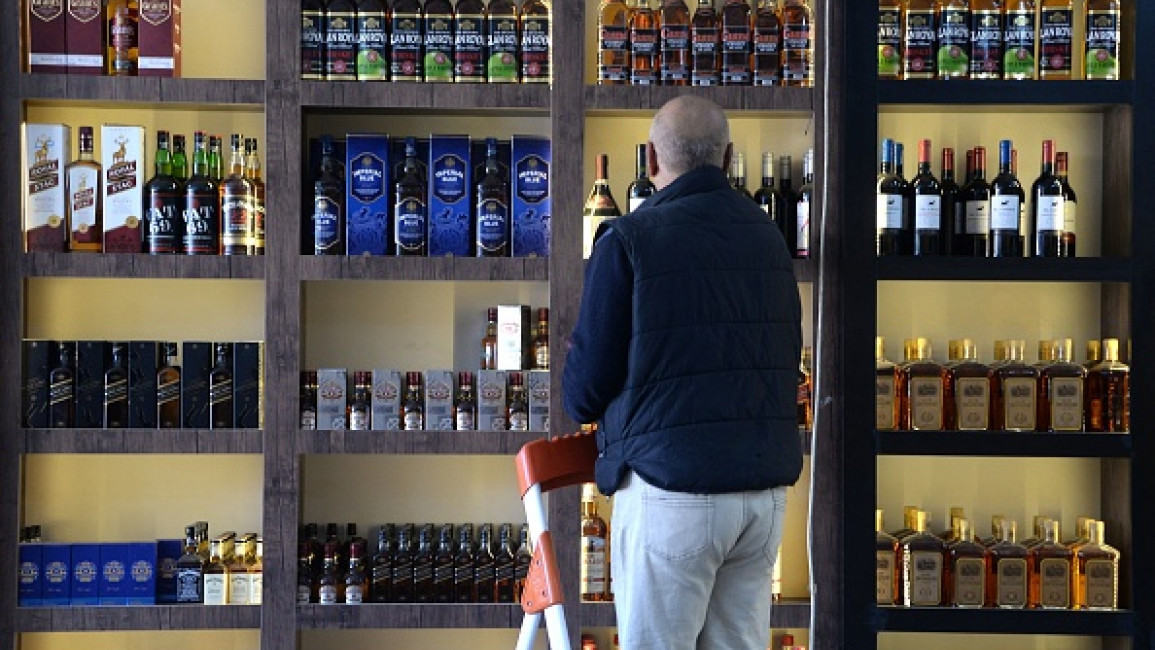Another round for all: Kurdish authorities will not follow Iraq's ban on alcohol imports
Authorities in the Iraqi Kurdistan region will not implement a ban on alcohol imports that became law in Iraq last month despite divisions over the legislation, according to sources
Iraq's customs department on Saturday ordered all customs across the country, including the Kurdistan region, to start enforcing it, however, the semi-autonomous Kurdish region of northern Iraq is not carrying out the law.
"The Kurdistan Regional Government (KRG) will not carry out the ban on alcohol imports and selling," an official source in the KRG told The New Arab on condition of anonymity.
The new controversial legislation, which bans the sale, import or production of alcohol, was originally approved by parliament in 2016 but only became law following its publication in the official gazette on 20 February of this year.
The Iraqi government has directed border crossings & customs to implement banning of alcoholic beverages imports. This is a blatant violation of minorities rights, civil rights, & puts Iraq on a dangerous path of forcing strict Sharia law on Iraqi citizens. pic.twitter.com/d5HDo0YrG9
— Murad Ismael (@murad_ismael) March 4, 2023
Public alcohol consumption is frowned upon in mainly Muslim-majority Iraq, but beverages can be readily purchased from liquor stores, many of them run by Christians or other non-Muslims.
"The General Customs Authority has given orders to all customs centres to ban the entry of all types of alcoholic drink," the authority said in a statement.
The new law sets fines of between 10 million and 25 million dinars (US$7,700-US$19,000) for violations.
"The Iraqi authorities want to make the country like the Islamic Republic of Iran where alcohol consumption is a punishable act. All know that banning alcohol consumption is not acceptable, because it is conflicting with personal freedoms," Hama Sharif, a resident of Erbil, the capital city of the Kurdistan region, told TNA.
"Banning alcohol means people will try to get it from the black market or resort to home-made beverages that will have dire health consequences on those who drink it," he added.
Meanwhile, the Babylon Christian bloc in the Iraqi parliament on Sunday raised a complaint at Iraq's Supreme Federal Court against Mohammed al-Halbusi, the speaker of Iraq's parliament, for enacting the law.
"The law to ban alcohol has been passed in an indecent way. The law originally is not for the prohibition of alcoholic drinks, rather it is a tax law," Yunadem Kanna, an Iraqi lawmaker from the Babylon Christian bloc, told Al-Arabi Al-Jadeed, TNA's Arabic language sister website.
"It is not possible to pass any law that contradicts the rights and freedoms enshrined in the Iraqi constitution that guarantees the rights and freedoms of all religions and components in the country. The law disregards the rights of non-Muslim minorities, tourists, and personnel working in the diplomatic sphere," he said.
According to the lawmaker, the law also contradicts a government decree adopted less than a week earlier on 14 February, setting duty at 200 per cent on all imported alcoholic drinks for the next four years.
The legislation also drew sharp criticism from rights activists, particularly those campaigning for the rights of Iraq's dwindling non-Muslim communities.
Yazidi activist Murad Ismael underlined in a tweet that even though non-Muslim faiths do not ban alcohol, "the legislation imposes the same restrictions" on their followers as on Muslims.
Mustafa Saadoon, of the Iraqi Observatory for Human Rights, said the alcohol ban formed part of a "comprehensive package aimed at restricting freedoms".
He recalled a spate of arrests last month targeting "decadent content" posted on social media platforms.
Although the alcohol ban is a federal law, it is unlikely to apply in Iraq's autonomous Kurdish region, which operates its own customs posts on the northern border with Turkey.



